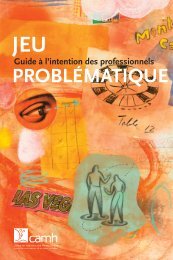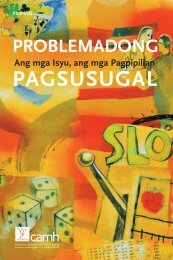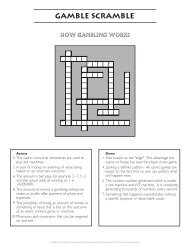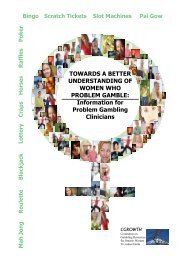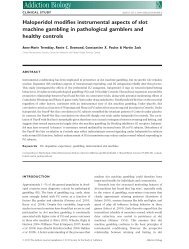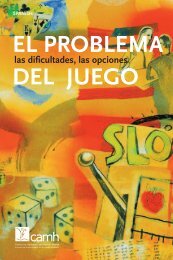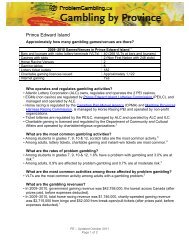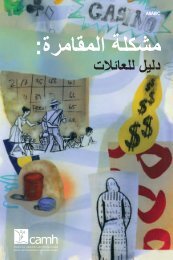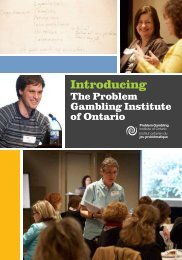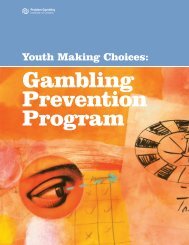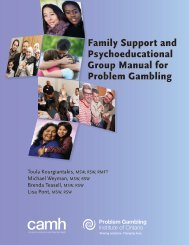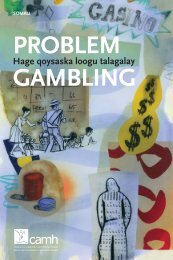ProblemGambling.ca
ProblemGambling.ca
ProblemGambling.ca
- No tags were found...
You also want an ePaper? Increase the reach of your titles
YUMPU automatically turns print PDFs into web optimized ePapers that Google loves.
PROBLEMThe Issues, the OptionsGAMBLING
ContentsAcknowledgements 5Introduction 71 What Is Gambling? 92 What Is Problem Gambling? 113 The Effects of Gambling 174 Getting Help 235 Where to Find Help 313
AcknowledgmentsThis guide builds on the knowledge and experience of thestaff of the Problem Gambling Project at the Centre forAddiction and Mental Health (<strong>ca</strong>mh). We also received inputfrom counsellors and others across Ontario who work withpeople affected by problem gambling. Finally, we are gratefulto the clients who reviewed the manuscript and gave theirvaluable advice.Problem Gambling: The Issues, the Options was produced bystaff of the Program Development department at <strong>ca</strong>mh.5
IntroductionThis guide is for people who have problems with gambling. Ifsomeone close to you gambles too much, please see the bookletProblem Gambling: A Guide for Families.You may be worried about your gambling, or people you <strong>ca</strong>reabout may be upset by it. Through this guide, we hope to helpyou:• understand the difference between low-risk and harmfulgambling• understand how gambling may be affecting your life• decide whether you need to stop, cut down or change yourgambling• learn how counselling <strong>ca</strong>n help you• find resources that have helped other people with gamblingproblems.Your life may feel out of control right now. Gambling maybe <strong>ca</strong>using money and family difficulties. Your health may besuffering. These are serious problems.But with help, you <strong>ca</strong>n get over your gambling problems. Speciallytrained counsellors have helped thousands of peoplestop or control their gambling. People with gambling problemsdo recover. You <strong>ca</strong>n be one of them.By picking up this guide, you have taken an important firststep.7
Problem Gambling: The Issues, the Options(“Gambling Problems: The Numbers” continued)• The average amount each Canadian spent on gambling in 2009was $515, compared to $130 in 1992. The average amount eachOntarian spent in 2009 was $455, compared to $105 in 1992. 2• It is estimated that 1.2% 3 - 3.4% 4 of Ontarians are affected bymoderate and severe problem gambling.• The highest rate of moderate and severe gambling problems(6.9%) is among young adults, aged 18 to 24. 4• In a 2006 study, 63.3% of adults said they had gambled at leastonce in the past year. 4• Buying lottery tickets is the most common gambling activityengaged in by adults. 4Canada• More than half of all women and men living alone report spendingmoney on at least one gambling activity, but men spendsignifi<strong>ca</strong>ntly more than women. 2• Gambling is Canada’s largest entertainment industry—it is aboutthe same size as movies, TV, recorded music and professionalsports combined. 5references1. Ontario Lottery and Gaming. (2010). OLG 2009–2010 Annual Report. Available:http://www.olg.<strong>ca</strong>/assets/documents/annual_report/annual_report_09-10.pdf.Accessed February 8, 2012.2. Marshall, K. (2011). Gambling 2011. Component of Statistics Canada Catalogueno. 75-001-X: Perspectives on Labour and Income. Available: www.stat<strong>ca</strong>n.gc.<strong>ca</strong>/pub/75-001-x/2011004/article/11551-eng.pdf. Accessed: February 8, 2012.3. Williams, R.J., Volberg, R.A. & Stevens, R.M.G. (2012). The Population Prevalenceof Problem Gambling: Methodologi<strong>ca</strong>l Influences, Standardized Rates, JurisdictionalDifferences, and Worldwide Trends. Report prepared for the Ontario <strong>ProblemGambling</strong> Research Centre and the Ontario Ministry of Health and LongTerm Care. March 2012.4. Wiebe, J., Mun, P. & Kauffman, N. (2006). Gambling and Problem Gamblingin Ontario 2005. Toronto: Responsible Gambling Council. Available: www.gamblingresearch.org/content/research.php?appid=1043. Accessed January19, 2012.5. Rutsy, B. (2009). Four years and counting. Canadian Gaming Business, 4 (3), 6.10
2What Is <strong>ProblemGambling</strong>?Problem gambling is not just about losing money. Gamblingproblems <strong>ca</strong>n affect a person’s whole life.Gambling is a problem when it:• gets in the way of work, school or other activities• harms your mental or physi<strong>ca</strong>l health• hurts you financially• damages your reputation• <strong>ca</strong>uses problems with your family or friends.Gambling problems occur along a continuum. These are not discrete<strong>ca</strong>tegories but possible points along a range of involvement.NoGamblingCasualGamblingSeriousGamblingHarmfulGamblingPathologi<strong>ca</strong>lGambling• No gambling: Some people never gamble.• Casual gambling: Most people gamble <strong>ca</strong>sually, buying theoc<strong>ca</strong>sional raffle or lottery ticket or oc<strong>ca</strong>sionally visiting a <strong>ca</strong>sinofor entertainment.• Serious gambling: These people play regularly. It is theirmain form of entertainment, but it does not come beforefamily and work.11
Problem Gambling: The Issues, the Options• Harmful gambling: These people are experiencing difficultiesin their personal, work and social relationships due to theirgambling.• Pathologi<strong>ca</strong>l gambling: For a small but signifi<strong>ca</strong>nt numberof people, gambling seriously harms all aspects of their lives.People with gambling problems this severe are unable to controlthe urge to gamble, despite the harm it <strong>ca</strong>uses. These peopleare more likely to use gambling to es<strong>ca</strong>pe from problemsand to get relief from anxiety.People withgamblingproblems arefound in all agegroups, incomegroups, culturesand jobs.Not all people who gamble too much are alike, nor are theproblems they face. People with gambling problems arefound in all age groups, income groups, cultures and jobs.Some people develop gambling problems suddenly, othersover many years. There are many reasons why a gamblingproblem may develop. For example, some people developproblems when they try to win back money they have lost,or be<strong>ca</strong>use they like to “zone out.” Others have many life stressesthat make gambling a welcome relief.Low-Risk Gambling and HarmfulGamblingNot all gambling is a problem. Gambling may be low-risk or itmay be harmful. Low-risk gambling means you:• limit how much time and money you spend gambling• accept your losses, and don’t try to win them back• enjoy winning, but know it happened by chance• balance gambling with other fun activities• don’t gamble to earn money or pay debts• don’t gamble when drinking alcohol or using other drugs• never borrow money or use personal investments or familysavings to gamble• don’t gamble to es<strong>ca</strong>pe from your problems or feelings• don’t hurt your job, health, finances, reputation or familythrough your gambling.12
What Is Problem Gambling?Harmful gambling means you have started to:• lie about your gambling or keep it a secret• lose track of time and play for longer than you meant to• feel depressed or angry after gambling• spend more money than you planned, or more than you <strong>ca</strong>nafford• ignore work and family responsibilities be<strong>ca</strong>use of gambling• borrow money or use household money to gamble• “chase your losses” to try to win back your money• believe that gambling will pay off in the end• see gambling as a very important thing in your life• use gambling to cope with your problems or to avoid things• have conflicts with family and friends over gambling• ignore your physi<strong>ca</strong>l and emotional health be<strong>ca</strong>use ofgambling.To help decide whether your gambling is a problem, completethe following quiz.do i have a gambling problem?The Problem Gambling Severity Index (pgsi) is a questionnairethat will help you decide whether you need to change yourgambling. Circle the answer that is true for you, and total yourscores at the end.In the last 12 months:Have you bet more than you could afford to lose?0 1 2 3Never Sometimes Most of the time Almost alwaysHave you needed to gamble with more money to get the sameexcitement?0 1 2 3Never Sometimes Most of the time Almost always13
Problem Gambling: The Issues, the OptionsHave you gone back another day to try to win back money youhad lost?0 1 2 3Never Sometimes Most of the time Almost alwaysHave you borrowed money or sold anything to get money togamble?0 1 2 3Never Sometimes Most of the time Almost alwaysHave you felt that you might have a problem with gambling?0 1 2 3Never Sometimes Most of the time Almost alwaysHas gambling <strong>ca</strong>used you any health problems, including stressor anxiety?0 1 2 3Never Sometimes Most of the time Almost alwaysHave people criticized your betting or said you had a gamblingproblem (whether or not you thought it was true)?0 1 2 3Never Sometimes Most of the time Almost alwaysHas your gambling <strong>ca</strong>used any money problems for you or yourhousehold?0 1 2 3Never Sometimes Most of the time Almost alwaysHave you felt guilty about the way you gamble or about what happenswhen you gamble?0 1 2 3Never Sometimes Most of the time Almost always14
What Is Problem Gambling?Total ScoreThe higher you score, the greater the risk that your gambling isa problem.8+3–71–208 or more High-risk gambling—A person scoring in this rangemay be dependent on gambling, and experiencinga substantial level of gambling related problems.3–7 Moderate-risk gambling—A person scoring in thisrange will already be experiencing some problemsrelated to gambling.1–2 Low risk gambling—A person scoring in this rangemay have experienced one or two minor problemsrelated to gambling.0 Non-problem gambling—A person scoring zeroexperienced no gambling problems in the last year.The pgsi score shows whether a person’s gambling should be considereda problem. High scores usually mean serious problems.The diagram above is in the shape of a pyramid to show thatthere are more people with low scores than high scores.Risk FactorsThere are many risk factors for problem gambling. Riskfactors are things that make a person more likely to developgambling problems. You are more at risk if:• you had a big win early in your gambling history• you have money problemsYou are moreat risk for gamblingproblemsif you have hada recent loss orchange, suchas relationshipproblems,divorce or jobloss.15
Problem Gambling: The Issues, the Options• you have had a recent loss or change, such as relationship problems,divorce, job loss, retirement or the death of a loved one• you are gambling to cope with a health concern and/or physi<strong>ca</strong>lpain• you often feel lonely• you have few interests and hobbies, or you feel your life lacksdirection• you often feel bored, take risks or act without thinking• you use gambling, or alcohol or other drugs, to cope with badfeelings or events• you often feel depressed or anxious• you have been abused or traumatized• you have (or had) problems with alcohol or other drugs,gambling or overspending• someone in your family has had problems with alcohol orother drugs, gambling or overspending• you think you have a system or way of gambling that increasesyour odds of winning• you have easy access to your preferred form of gambling• you do not take steps to monitor gambling wins and losses.The more items in this list that are true for you, the more <strong>ca</strong>reyou need to take in your gambling.How to Get HelpIf you think you have a gambling problem, you <strong>ca</strong>n get help.Chapter 4 tells you how.16
3The Effects of GamblingWhy Can’t I Just Stop?“How did this happen? I <strong>ca</strong>n’t believe all the trouble I’m in.”“If I stop gambling now, I’ll have to admit I’m a total loser. There’s noway I <strong>ca</strong>n pay back all the money I owe.”“If I had the money to invest, I’m sure my luck would change. I justneed one more win.”“Even if I had another win, I’d probably just lose it again.”“I <strong>ca</strong>n’t face this mess alone, but I’m too embarrassed to ask forhelp.”“I should be able to solve my own problems. How could I be so stupid?”“I never thought it would get this bad.”Do these statements sound familiar? Most people with gamblingproblems say they lost control over how much timeand money they spend gambling. Meanwhile, they ignoredother responsibilities. They knew they had problems, but onlygambling seemed important.Many people who gamble too much have mixed feelingsabout gambling. They know they are <strong>ca</strong>using problems for thepeople they love. They may become anxious and unhappy, and17
Problem Gambling: The Issues, the Optionsoften hate themselves. But the urge to gamble seems too greatto resist. They feel they <strong>ca</strong>n’t give up on all the time, moneyand emotion they have put into gambling. They <strong>ca</strong>n’t acceptthat they will never win back what they have lost. Some peoplestill believe their system will pay off, their luck will change orthey are due to win. Others believe that continuing to gambleis the only way out of a situation they are ashamed about.Other people promise to quit, but <strong>ca</strong>n’t. They fear their lovedones will find them out. This drives them deeper into hidingand further into debt. They keep hoping a big win will endtheir problems. Once in a while they may win, which keepstheir hope alive—until the losses mount up again. If they quitnow, they will feel like a loser. They will have to face all theproblems gambling has <strong>ca</strong>used.It is hard tochange yourgambling onyour own.Counselling<strong>ca</strong>n help youfind long-termsolutions.If you are like most people who gamble too much, you mayhave tried to cut down or stop many times. It is hard to changeyour gambling on your own. Counselling <strong>ca</strong>n help you findlong-term solutions to your problems.Risks and Rewards of GamblingMany people have mixed feelings about gambling (see below).You may not want to give up gambling. At the same time, youmay see it is <strong>ca</strong>using you harm. Mixed feelings like these <strong>ca</strong>nbe very confusing. With the help of a counsellor, you <strong>ca</strong>n lookat your situation and make a plan of action.gambling rewards and risksYou may have mixed feelings about gambling. Perhaps yourecognize yourself in statements about rewards and risks inthese lists:18
The Effects of GamblingRewardsI gamble be<strong>ca</strong>use:• I love the thrill of playing.• I know a big payout could solve all my problems.• Gambling is my only shot at becoming rich.• I feel important when I win.• I have a sure system. It’s just a matter of time before I winagain.• When I am winning, I <strong>ca</strong>n make money fast and easily.• Gambling helps me forget my problems and pain for a while.• Gambling is the one thing in my life that is just for me.• Gambling gets me out of the house.• All my friends gamble.RisksI’m thinking about getting help be<strong>ca</strong>use:• My partner is threatening to leave me if I don’t stop.• I fight with people about my gambling.• I’m tired of sneaking around, lying and hiding my losses.• My reputation has been hurt.• Creditors are hassling me. I’m in really bad debt.• Gambling is all I ever think about. It has taken over my life.• I’ve stopped <strong>ca</strong>ring about things that should be importantto me.• I’ve borrowed money from so many people. I <strong>ca</strong>n’t face them.• I’m afraid I’ll lose my job.• My health is suffering.• I don’t even enjoy gambling most of the time.• I feel like such a loser. Sometimes I hate myself so much Iwant to end it all.19
Problem Gambling: The Issues, the OptionsGamblingproblems<strong>ca</strong>use strongfeelings amongfamily members,whichmakes it harderto solve theproblems.Impact on FamiliesGambling problems hurt families in many ways:• Money problems: When family members learn that savings,property or belongings have been lost, it <strong>ca</strong>n make them feels<strong>ca</strong>red, angry and betrayed.• Emotional problems and isolation: Gambling problems <strong>ca</strong>usestrong feelings among family members, which makes itharder to solve problems. Many partners of those with gamblingproblems do not want to be emotionally or physi<strong>ca</strong>llyclose with the person who has hurt them. Family membersmay avoid other people, be<strong>ca</strong>use they feel ashamed. Thismakes it hard to get love and support.• Physi<strong>ca</strong>l and mental health: The stress of gambling problemssometimes <strong>ca</strong>uses health problems, for both the person whogambles and the family. These <strong>ca</strong>n include anxiety, depressionand stress-related problems such as poor sleep, ulcers, bowelproblems, headaches and muscle pains.• Burnout: Many families under stress have trouble coping. Onemember may try to keep things in control by taking on moretasks. This <strong>ca</strong>n lead to burnout. Family members often forgetto take <strong>ca</strong>re of themselves or to have fun.• Impact on children: When a parent or <strong>ca</strong>regiver has a gamblingproblem, children <strong>ca</strong>n feel forgotten, depressed and angry.They may believe they <strong>ca</strong>used the problem and that, if theyare “good,” the problem will stop. Children may believe theymust take sides between their parents. They may stop trustinga parent who makes promises he or she doesn’t keep. Somechildren may try to draw attention away from the parent withthe gambling problem by misbehaving.• Physi<strong>ca</strong>l and emotional abuse: Family violence is more commonwhen families are in crisis. Gambling problems <strong>ca</strong>n leadto physi<strong>ca</strong>l or emotional abuse of a partner, elder parent orchild. If this is happening in your family, get help right away(see Chapter 5).20
The Effects of GamblingAnxiety and DepressionMany people who gamble excessively feel stressed, anxiousand depressed. This <strong>ca</strong>n make sleeping, thinking and solvingproblems more difficult.If you have some of the following symptoms for more thantwo weeks, making your day-to-day life difficult, you may havea major depression:• You have lost interest in usual activities.• You feel depressed, down or irritable.• Your sleep has changed (e.g., you have problems falling asleepor staying asleep, or you sleep too much).• Your appetite has changed. You have lost or gained weight.• You feel helpless, hopeless or despairing.• It is hard to think and to remember things, and your thoughtsseem slower.• You go over and over guilty feelings. You <strong>ca</strong>n’t stop thinkingabout problems.• You have lost interest in sex.• You feel physi<strong>ca</strong>lly tired, slow and heavy; or you feel restlessand jumpy.• You feel angry.• You think about suicide.If you have any of these difficulties, speak to your family doctoror other health <strong>ca</strong>re professional (a problem gambling counsellor<strong>ca</strong>n also make sure you get the help you need). Tell himor her about your gambling problems, too. Treatment may includemedi<strong>ca</strong>tions and/or counselling and other support.Suicide RiskRates of suicide are higher for people who gamble excessively,and for their family members. The people most likely to attemptsuicide are those who also have mental health problems(such as depression) or who heavily use alcohol or otherIf you aredepressed,speak to ahealth <strong>ca</strong>reprofessional.Tell him or herabout yourgamblingproblems, too.21
Problem Gambling: The Issues, the Optionsdrugs. People who have threatened suicide or hurt themselvesin the past are also more at risk.If you feelsuicidal or aremaking plansto end your life,get help rightaway.If you feel suicidal or are making plans to end your life, get helpright away. You don’t have to deal with your problems alone.what to do if you feel suicidalIf you are thinking about ending your life:• Get to your lo<strong>ca</strong>l emergency department immediately.• Remove any means for ending your life (e.g., firearms,medi<strong>ca</strong>tions).• Let your family or a friend know how you are feeling.• Call the lo<strong>ca</strong>l Distress Centre for support and information (seepage 33).• Let your doctor know what is going on, including your gambling.• Do not drink alcohol or take other drugs—it will make mattersworse.• Contact the Ontario Problem Gambling Helpline (1 888 230-3505)and arrange to see a counsellor as soon as possible (see page 32).You <strong>ca</strong>n usually be seen within days.• Talk to someone you trust, such as a friend or spiritual advisor.22
4Getting HelpIf you think you have a gambling problem, you <strong>ca</strong>n get help.The Ontario government sets aside a portion of the moneytaken by slot machines at charity <strong>ca</strong>sinos and racetracks. Thismoney pays for:• a problem gambling helpline• counselling for people with gambling problems• research on problem gambling• edu<strong>ca</strong>tion about gambling for the public and for mental healthprofessionals.Confidential and professional help is free and available toanyone affected by gambling. This includes family members.Counselling <strong>ca</strong>n help you understand why you gamble, so you<strong>ca</strong>n stop, cut down or change your gambling. It <strong>ca</strong>n also helprepair hurt feelings and regain trust with your family.What Is Gambling Counselling?Counselling is a place to talk about how problem gamblinghas touched your life. It is safe and private, and you won’t bejudged. Problem gambling counsellors are specially trained tounderstand your difficulties. You decide with your counsellorhow often you want help and what to talk about.There is no shame in seeking help. It is the first step to regainingcontrol of gambling and other problems.23
Problem Gambling: The Issues, the OptionsIn Ontario, freecounsellingis available toanyone affectedby problemgambling.In Ontario, counselling is free to anyone affected by problemgambling—not just the person who gambles. In most areas,an agency that offers counselling for problem gambling isavailable close to home. Residential and day treatment is alsoavailable in a number of lo<strong>ca</strong>tions in the province. In addition,telephone counselling and a self-help guide are also available.You may also benefit from credit and debt counselling services,family counselling and other resources. The OntarioProblem Gambling Helpline (1 888 230-3505) <strong>ca</strong>n link you tothe support and resources you need. It is open 24 hours a day.Some agencies offer evening and weekend appointments forface-to-face counselling. Counselling <strong>ca</strong>n be one-on-one, orwith your partner or family. Group counselling may also beavailable.Counselling is confidential, within legal limits. Your counsellorshould explain these limits to you before counselling begins.He or she should also tell you what you <strong>ca</strong>n expect fromcounselling, and what will be expected of you.How Can Counselling Help Me?People often ask if they will have to stop gambling to begincounselling. Only you <strong>ca</strong>n decide to quit gambling. Yourcounsellor will not pressure you to make changes before youare ready.Gambling affects people and their families in different ways.Problem gambling counsellors give you information aboutgambling. They help you look at your options so you <strong>ca</strong>n decidewhat is right for you. This may include taking a breakfrom gambling. Some people know right away what actionsthey want to take, and others aren’t sure. Either way, taking abreak from gambling <strong>ca</strong>n help. Then you <strong>ca</strong>n think about howgambling affects you, and how to get back in control.24
Getting HelpCounselling is a learning process. With new information, you<strong>ca</strong>n make good decisions. Counsellors <strong>ca</strong>n help you solve yourmain problems. This may include fixing your financial situation,learning how to handle stress and other problems, findingother things to do with your time, healing family relationsand restoring trust between you and your partner.Counselling <strong>ca</strong>n also help you:• gain control over your gambling• put your finances in order• heal family relationships• deal with your urge to gamble• get your life back in balance• deal with other life problems• avoid slipping back.Only you <strong>ca</strong>ndecide to quitgambling. Yourcounsellor willnot pressureyou to makechanges.Next we will talk more about these steps.gaining control over your gamblingSome people don’t want to stop gambling. They just want itto <strong>ca</strong>use less harm. Other people know that they must stopgambling completely.Counselling <strong>ca</strong>n help you reach your own goal. It will teachyou to control gambling by identifying triggers (things thatmake you want to gamble). If you know the warning signs,you <strong>ca</strong>n take action. Gambling triggers may include:• having money (e.g., on payday)• feeling bored, restless, angry, depressed or lonely• money worries or rising debts• drinking or taking other drugs• reading the sports section and daily market figures in thenewspaper• passing places to gamble• spending time with gambling friends• regular gambling times (e.g., Friday night bingo).25
Problem Gambling: The Issues, the Optionsputting your money in orderPeople with gambling problems often seek help after a crisiswith money. Steps for taking control of your money may include:• seeing how much debt you have and planning how do dealwith money problems, both urgent and long-term• getting financial and legal advice, such as credit counselling• setting a realistic budget• removing gambling triggers to protect your money.If you are part of a family, you may need to work together onthe family’s shared money problems.healing family relationsIt is important to win back trust from family members. Thismay feel impossible now. Not every relationship survives agambling problem.But with the help of a counsellor, you <strong>ca</strong>n work through concernswith family members at your own pace. Counsellors areskilled in helping you:• restore trust• learn how to communi<strong>ca</strong>te better• reduce guilt and raise self-esteem• begin to improve your relationships• repair the financial and emotional damage gambling has <strong>ca</strong>used• understand what your family may be going through, and whatyou <strong>ca</strong>n expect as the whole family gets better.dealing with gambling urgesCounselling teaches people how to reduce their gambling urgesand stay in control. You may already have some strategies. Counselling<strong>ca</strong>n help you learn others. The three main ways are:• changing your behaviour• changing how you think about gambling• dealing with your feelings.26
Getting Help1. Changing Your BehaviourChanging your gambling behaviour is important, especiallywhen you first start dealing with your problems, as this is oftena time when gambling urges are strong. Changing your lifestyle<strong>ca</strong>n help, including:• making clear goals about your gambling• identifying your gambling triggers and planning for them(e.g., avoiding gambling venues and gambling friends, restrictingyour access to money)• finding activities to replace gambling (e.g., time with friendsand family, pursuing old interests or trying new ones).You may want to block your own access to <strong>ca</strong>sinos or to Internetgambling sites. In <strong>ca</strong>sinos, this is <strong>ca</strong>lled self exclusion.Your counsellor <strong>ca</strong>n explain how self exclusion and/or Internetblocks <strong>ca</strong>n help you.2. Changing How You Think about GamblingPeople who gamble excessively have false beliefs about gambling.These beliefs <strong>ca</strong>use problems. Many people think theyare more skilled than they really are, or that their odds of winningare better than they really are. Other people believe theyhave special ways to increase their chances of winning.Counselling helps you uncover these beliefs so you <strong>ca</strong>n makedecisions based on accurate information. Understanding howgambling really works <strong>ca</strong>n be a big help in staying motivatedto change.3. Dealing with Your FeelingsMany people use gambling to avoid feelings of depression,anger or anxiety. Some use gambling to cope with abuse, sickness,loss or stress.Counsellinghelps youuncover falsebeliefs aboutgambling that<strong>ca</strong>use problems.Through counselling, you <strong>ca</strong>n learn to recognize your feelings,and express them in a healthy way. This helps reducethe urge to gamble. It also helps you restore health, well-beingand closeness with your family.27
Problem Gambling: The Issues, the OptionsCounselling<strong>ca</strong>n help youget your lifeback in balanceand find waysto replacegambling.getting your life back in balanceGambling problems are often about losing balance in yourlife. Counselling <strong>ca</strong>n help you and your family find a healthybalance, and find ways to replace gambling. Finding balanceincludes:• creating healthy routines (e.g., eating well, exercising and taking<strong>ca</strong>re of your physi<strong>ca</strong>l and emotional health)• getting support from friends and feeling better about yourself• learning to manage your stress• learning to deal with gambling triggers like being bored andlonely.dealing with other difficulties andfinding hopeGambling may not be your only difficulty. For example,people who gamble too much often struggle with alcohol orother drug problems, impulsivity (acting without thinking)and mental health concerns. Counselling <strong>ca</strong>n help you withthese problems and improve the overall quality of your life.When you have a gambling problem, it <strong>ca</strong>n be hard to findhope for the future. Counselling <strong>ca</strong>n help you see that things<strong>ca</strong>n change. Counselling works best when the whole familypulls together and supports each other. This is why help isavailable to all members of the family.Most people who have worked with a problem gambling counsellorsay it helped them. They say that:• they feel better about themselves• they are physi<strong>ca</strong>lly and mentally healthier• their thinking is clearer• their family relationships are better• they feel in control of their lives—not controlled by theirgambling• their debts are under control.28
Getting Helpavoiding relapseSometimes when people have started to recover, they slip backinto gambling again. There are many reasons for this. Slippingback, or relapse, happens to many people, anddoesn’t mean you <strong>ca</strong>n’t or won’t change. But it <strong>ca</strong>n make thework of change much harder, and threaten your progress.Your counsellor will help you look at how to avoid relapse, orhow to learn from a relapse so it doesn’t happen again.Sometimespeople slipback intogambling. Thisdoesn’t meanyou <strong>ca</strong>n’t orwon’t change.29
5Where to Find HelpProblem gambling <strong>ca</strong>n be overcome. You have taken an importantfirst step by reading this guide. What happens nextis up to you. Although you may feel overwhelmed by yourgambling and other problems, change is possible. And youdon’t have to do it alone. The following free and confidentialservices <strong>ca</strong>n give you the help you need to turn things around.Provincial and National ServicesOntario Problem Gambling Helpline (opgh)1 888 230-3505www.problemgamblinghelpline.<strong>ca</strong>A free, confidential and anonymous service. You <strong>ca</strong>n <strong>ca</strong>ll,e-mail or webchat 24 hours a day, seven days a week. opghprovides information, supportive listening, and referrals to:• treatment services for problem gambling• credit and debt counselling services• telephone counselling services, if available in your community.Translation is available in over 140 different languages.31
Problem Gambling: The Issues, the OptionsMultilingual Problem Gambling Service1 888 230-3505This network of trained professionals provides culturally competentproblem gambling treatment to people with gamblingproblems and their family members. These services are availablein many languages and are free and confidential.Problem Gambling Institute of Ontario (pgio),Centre for Addiction and Mental Health (<strong>ca</strong>mh)The Problem Gambling Institute of Ontario brings treatmentprofessionals and leading researchers together with expertsin communi<strong>ca</strong>ting and sharing knowledge. Their focus is oncollaboratively developing, modelling and sharing evidencebasedsolutions to gambling-related problems, within Ontarioand around the world.Ontario Association of Credit Counselling Services (oaccs)1 888 746-3328www.oaccs.comA not-for-profit organization that represents a membershipnetwork of accredited credit counselling agencies and certifiedcredit counsellors. Its aim is to enhance the personal financialwell-being of Canadians through financial literacy, edu<strong>ca</strong>tionand industry leadership. oaccs establishes and regulatesuniform standards of practice, knowledge, skills and ethicsfor the credit counselling and financial coaching profession.For more information or to find a credible credit counsellingagency in your area, <strong>ca</strong>ll 1 888 204-2221.Community Information Centres (cics)Dial 0 for the operator or dial 211.www.211Ontario.<strong>ca</strong>CICs are not-for-profit groups that gather information onlo<strong>ca</strong>l government services, community services and social services.These include crisis services, shelters and counselling.Call the operator to see if there is a cic in your area.32
Where to Find HelpKids Help Phone1 800 668-6868www.kidshelpphone.<strong>ca</strong>A free, 24-hour telephone support and information line forchildren and youth. Available in English and French.Responsible Gambling Council (rgc)www.responsiblegambling.comThe rgc helps individuals and communities address gamblingin a healthy and responsible way, with an emphasis on preventinggambling-related problems.Help Lines and Distress CentresCall the operator, or check the list of emergency numbers inthe front of your telephone book, for the distress centre orhelp line in your area.Gamblers Anonymous (ga)416 366-7613www.gamblersanonymous.orgga is available in many communities. Based on AlcoholicsAnonymous, ga uses a 12-step self-help approach to recovery.Gam-Anon and Gam-Ateen416 366-7613www.gam-anon.orgGam-Anon is peer support for family members and friends ofpeople with gambling problems.Legal ResourcesLawyer Referral Service (lrs)General Referral: 1 800 268-8326www.lsuc.on.<strong>ca</strong>/public/a/faqs---lawyer-referral-servicelrs will give you the names of lawyers (including those whoaccept legal aid) in your area who will provide a free half-hourconsultation.33
Problem Gambling: The Issues, the OptionsCommunity Legal Edu<strong>ca</strong>tion Ontario (cleo)416 408-4420www.cleo.on.<strong>ca</strong>cleo is a community legal clinic that specializes in public legaledu<strong>ca</strong>tion. Most of its publi<strong>ca</strong>tions are written for peoplewith low incomes, and other disadvantaged groups, includingimmigrants and refugees, seniors, women and injured workers.The main topics include social assistance, landlord andtenant law, refugee and immigration law, workers’ compensation,women’s issues, family law, employment insurance andhuman rights.Legal Aid Ontario1 800 668-8258www.legalaid.on.<strong>ca</strong>Legal Aid <strong>ca</strong>n help you pay for legal help if you have a lowincome. If you qualify, you <strong>ca</strong>n get financial help for a varietyof legal problems, including criminal matters, family law, andimmigration and refugee law. You may also be able to get helpwith some civil <strong>ca</strong>ses and final appeals.Suggested ReadingBlaszczynski, A. (1998). Overcoming Compulsive Gambling: ASelf Help Guide Using Cognitive Behavioural Techniques. London,England: Constable & Robinson.Davis, R. D. (2009). Taking Back Your Life: Women and <strong>ProblemGambling</strong>. Center City, Minnesota: Hazelden Publishing.Derevensky, J. (In press). Teen Gambling: Understanding aGrowing Epidemic. New York: Rowman & Littlefield.Humphrey-Jones, H. & Slawik, M.A. (2008). Crossing the Line:When Gamblers Turn to Crime. New York: iUniverse Incorporated.Perkinson, R. R. (2011). The Gambling Addiction Client Workbook(2nd ed.) Thousand Oaks, CA: Sage Publishing.34
Where to Find HelpProchaska, J., Norcross, J. & Diclemente, C. (1994). Changingfor Good. New York: William Morrow.Shaffer, H. J., Martin, R. J., Kleschinsky, J. H. & Neporent, L.(In press). Change Your Gambling, Change Your Life: Strategiesfor Managing Gambling and Improving Your Finances, Relationshipsand Health. San Francisco: Jossey-Bass.Sojourner, M. (2010). She Bets Her Life: A True Story of GamblingAddiction. Berkeley, CA: Seal Press.Ustok, L. & Hughes, J. (2011). First Steps Out of Problem Gambling.Oxford, England: Lion Hudson.Wolfe, D. A., Ballon, B. & Chaim, G. (2011). What Parents Needto Know about Teen Risk Taking: Strategies for Reducing ProblemsRelated to Alcohol, Other Drugs, Gambling and Internet Use.Toronto: Centre for Addiction and Mental Health.Useful WebsitesProblem Gambling Institute of Ontario (pgio)www.problemgambling.<strong>ca</strong>If you are concerned about your gambling, or someone else’s,<strong>ProblemGambling</strong>.<strong>ca</strong> <strong>ca</strong>n help you explore your concerns.This website includes online self-help tools that help peoplewith gambling problems and their families and friends findanswers and get direction. The site is free and anonymousto use.Compulsive Gamblers Hubwww.cghub.homestead.comAn Internet self-help group based on Gamblers Anonymous.GamBlockwww.gamblock.comGamBlock blocks access to Internet gambling sites. It helps35
Problem Gambling: The Issues, the Optionspeople with gambling problems avoid the dangers of onlinegambling. US$94.95Journal of Gambling Issueswww.<strong>ca</strong>mh.net/egamblingAn online publi<strong>ca</strong>tion that aims to help make sense of howgambling affects us all, through the publi<strong>ca</strong>tion of peerreviewedarticles that focus on gambling as a social phenomenonand the prevention and treatment of gambling problems.Know Your Limit—Play Within Itwww.knowyourlimit.<strong>ca</strong>This website, sponsored by olg, provides information abouthow gambling works in Ontario, myths and facts, game odds,and helpful tips to keep gambling fun.Mood Disorders Society of Canadawww.mooddisorders<strong>ca</strong>nada.<strong>ca</strong>Niagara Multilingual Problem Gambling Programwww.gamb-ling.comProblem gambling information in 11 languages.Ontario Problem Gambling Research Centrewww.gamblingresearch.orgAn arms-length funding agency that invests in research on problemgambling, increases Ontario’s <strong>ca</strong>pacity to conduct researchon gambling problems, and disseminates research findings.ym<strong>ca</strong> Youth Gambling Programwww.ym<strong>ca</strong>gta.org/en/who-we-work-with/edu<strong>ca</strong>tors/gambling/index.htmlYouthBetwww.youthbet.netAlso see the websites listed under Provincial and NationalServices, beginning on page 31.36
Copies of this resource and others are availablefor download at www.<strong>ProblemGambling</strong>.<strong>ca</strong>.Ontario Problem Gambling Helpline1 888 230-3505



